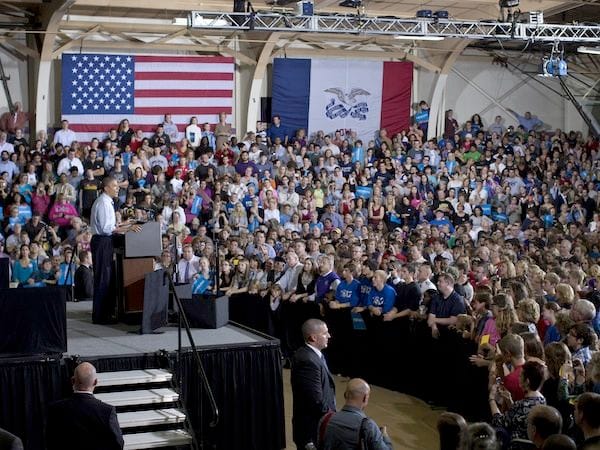In Last Days of Presidential Race, Iowa Gains Importance

Photo: Carolyn Kaster

Among many important states this election, there is one in particular that is gaining attention in the last days of the presidential race: Iowa. Iowa is fairly rural and has a large white population (93 percent, according to census data), with an economy that has been well insulated from the recession.
Its historical importance to presidential elections is highlighted during the caucuses but media focus sometimes trails off as the campaign trail wears on. It seems that Iowa could play an imperative role on November 6, where candidates have spent a disproportionately large amount of money for the state's small number of electoral votes.
According to a CBS News report:
"With just 14 Iowa field offices, the Romney campaign and aligned Republican committees have only a fraction of the staff on the ground that their Democratic opponents have at their disposal."
Despite this, the latest surveys from Public Policy Polling (PPP) show Obama is leading the GOP challenger Mitt Romney, 50 to 45 among likely voters. This a 3-point bump for the president from the same poll ending last week. The Romney campaign believes that they are outperforming their goal in Iowa although this isn't necessarily indicative of a sweep for the Republican, which is a full of blue collar counties located in the southeast.
On Monday, Mitt Romney said he feels optimistic about the election when he attended a rally in Seven Cities Sod with over 2,250 supporters. Additionally, he spoke on his agenda for the next four years, including his tax and economic plans.
The Iowa caucuses are always the first in the nation in the process of nominating presidential candidates. Often times, Iowa's support of a candidate will give an indication of how the rest of the nation might vote in an election year.
Obama won the Iowa caucus in 2008, which eventually landed him in the Oval Office later that year. He also won the state's six electoral votes in that election. This time around, the president may still have some work to do to guarantee the state's votes.


